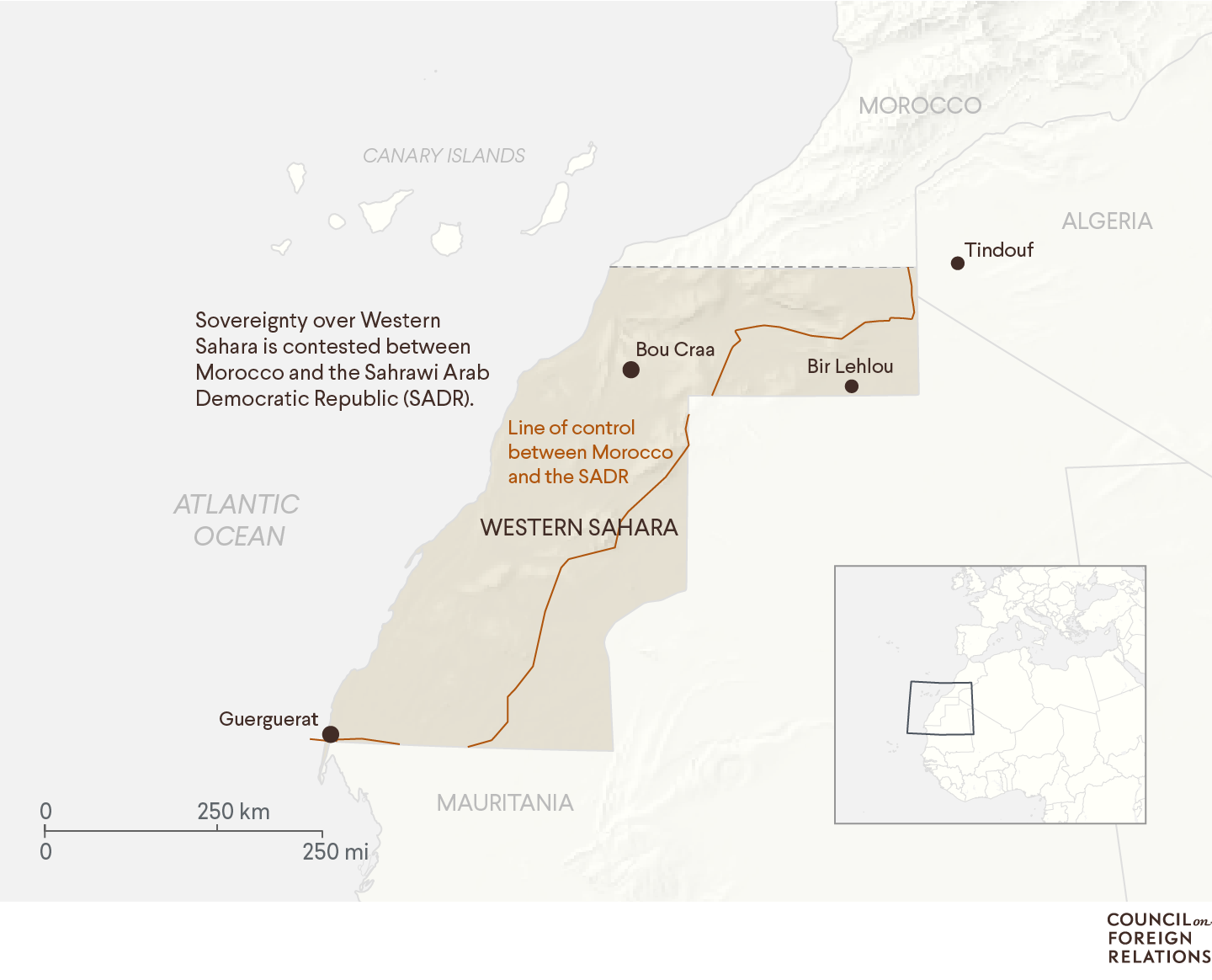In Brief
What Does the Western Sahara Conflict Mean for Africa?
After a decades-long cease-fire crumbled in 2020, Morocco and the pro-independence Polisario Front have resumed fighting over the disputed Western Sahara.
Tensions are again rising over Western Sahara, a long-disputed territory on the northwest coast of Africa that has seen decades of conflict launched by local pro-independence forces against the Moroccan government. The fight for control over Western Sahara has pitted African neighbors against each other, and with a longstanding UN-backed cease-fire collapsing in 2020, the conflict has the potential to challenge regional stability.
What is the status of Western Sahara?
Sovereignty over Western Sahara, a mostly desert territory on the west coast of Africa, is heavily contested. Morocco controls more than three-quarters of the region, which Rabat refers to as the “Moroccan Sahara.” The Sahrawi Arab Democratic Republic (SADR), a self-declared state representing the Indigenous Sahrawi people, also claims sovereignty over Western Sahara, considering it occupied territory.
More on:
The United Nations does not recognize Morocco’s sovereignty claims, instead considering the area to be a non-self-governing territory and drawing on a 1975 international court ruling that found neither Morocco nor neighboring Mauritania had legitimate historical claims to the region. As of 2022, forty-seven UN member states recognize the independence of the SADR, but not the United States or the European Union. The African Union (AU), a regional grouping of fifty-five states, recognizes the SADR as a member.

How has the conflict evolved?
Western Sahara was an overseas Spanish colony from the 1880s until the mid-1970s. Mauritania and Morocco both laid claim to the territory after Spain withdrew, partitioning it between them. In 1975, the Polisario Front, the political and military force that proclaimed the SADR, launched a guerrilla war against both countries. After Mauritania signed a peace deal with the Polisario and withdrew in 1979, Morocco annexed the remainder of the Western Sahara, and the conflict continued.
The UN Security Council established a peace plan for Western Sahara in 1991 that included a cease-fire, a contingent of UN peacekeepers, and a future referendum on the question of self-determination based on the UN’s recognition of the Polisario as the legitimate representative of the Sahrawi people. However, the referendum was continually delayed over objections from Morocco, including in regard to voter eligibility. By 2007, Rabat abandoned the idea and started pushing for limited autonomy for the region instead. Several hundred peacekeepers are still deployed there.
In 2020, the Moroccan military cracked down on a major Sahrawi civilian protest, triggering the Polisario Front to state that it would no longer abide by the terms of the UN plan over claims that Morocco had violated the cease-fire. The group renewed attacks on Moroccan positions in the region, and military clashes continue, with the two sides exchanging drone strikes and shell fire as recently as November. The previous month, the UN envoy to Western Sahara proposed dividing the disputed territory between Morocco and the Polisario Front, but neither accepted the proposal.
More on:
What’s at stake for Africa?
The dispute over Western Sahara has been a major flash point in the rivalry between Morocco and neighboring Algeria, which can be traced back to a decades-old border conflict. In 1975, the Polisario Front relocated its headquarters to the town of Tindouf in Algeria, which has since provided the group with military aid and allowed it to operate out of Algerian territory. Bilateral tensions increased after Morocco normalized relations with Israel in 2020 in exchange for the United States’ recognition of its claim to Western Sahara. This led Algeria to sever diplomatic ties with Morocco in 2021. Additionally, Iran has reportedly supplied arms to the Polisario Front, sparking further concerns that Western Sahara is being used as a proxy by regional powers.
The Western Sahara conflict has also driven up tensions within the African Union, whose decision to grant membership to the SADR in 1984 led Morocco to withdraw from the bloc. Morocco rejoined the AU in 2017, and since then the bloc has largely avoided the issue.
Western Sahara is also of major economic importance: Together, Morocco and Western Sahara are estimated to contain 70 percent of the world’s phosphate reserves, which are crucial to fertilizer production and thus global food supply chains. One mine in Western Sahara, Bou Craa, produces about 10 percent of Morocco’s total phosphate exports, and some experts say that renewed conflict could disrupt its production.
What are the prospects for resolution?
Diplomatic pressure could be building for an end to the conflict. Morocco’s plan would grant autonomy for Western Sahara while keeping it under Moroccan control. This idea gained international backing, including support from many Western nations such as the United States, France, and Spain, while support for the SADR has weakened. According to experts, countries such as France and Spain are keen to maintain good relations with Morocco because they need its help on other issues, namely migration management and counterterrorism. However, the Polisario Front hasn’t moved from its demands for a referendum on independence, leaving negotiations at large.
Esther Sun is an editorial intern at CFR.
 Online Store
Online Store
